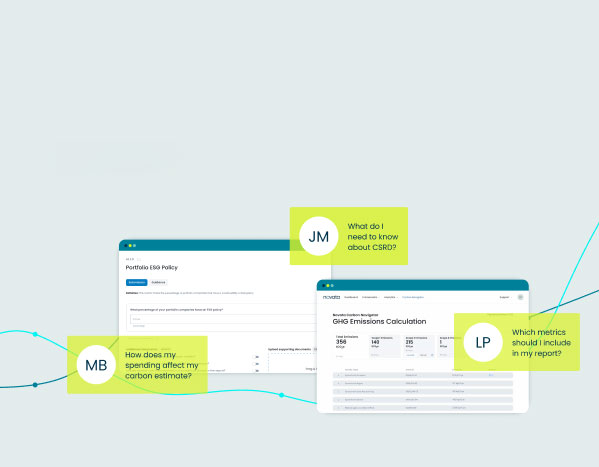As environmental, social, and governance (ESG) obligations and demand for transparency have grown over recent years, so has the uptick in the term “greenwashing.” The term encompasses a variety of activities with complicated nuances, making it a difficult topic in the discussion of sustainability. This article aims to break down the different types of greenwashing to make them easy to identify — and avoid.
While there is currently no legal definition, the UK Law Society describes greenwashing as untrue and misleading statements made about the environmental performance or impact of a business, product, or service. It is a concept we’re also seeing incorporated into laws across the globe such as the Sustainable Finance Disclosure Regulation (SFDR), which specifically aims to reduce greenwashing and improve transparency of ESG information.
The issue of greenwashing is increasingly prominent across all industries. A 2021 McKinsey survey showed that 88% of American Gen Zers do not trust brands’ environmental, social, and governance claims. Similarly, the European Commission conducted a study which revealed that 53.3% of the 150 examined environmental claims in the EU were considered “vague, misleading, or false,” while 40% were unsubstantiated. Making false claims, whether intended or not, can result in reputational damage and even litigation. Understanding what the term means and the importance of having data to support claims is key and can protect firms from potential risks.
Greenwashing is a broad concept and can be broken down into five core areas:
1. Green-labelling
This practice is often linked to marketing strategies employed by companies that take advantage of the abundance of environmental labels and initiatives that exist today. This form of greenwashing revolves around deceiving consumers by suggesting that a specific product or initiative is “green” or sustainable, using misleading narratives and trendy sustainable buzzwords.
For investors and stakeholders, it’s crucial to carefully examine their companies’ claims and commitments. This review is necessary to avoid potential accusations of green-labelling, as misleading claims, if identified, can have a negative impact on both the firm and the company’s reputation.
2. Green-crowding
Typical of late adopters, this term describes the act of opting for the bare minimum when it comes to ESG by hiding behind group sustainability initiatives. While aligning with industry peers for a sustainable future is a positive move, it’s important to be wary of a potential downside: some firms may choose to hide in the crowd to escape scrutiny. Companies that engage in green-crowding may appear to be meeting sustainability standards publicly, but beneath the surface, it could be a strategic maneuver to divert attention from their actual shortcomings in fulfilling ESG commitments.
Green-crowding is a reminder that genuine commitment goes beyond appearances and urges stakeholders to delve deeper into companies’ sustainability practices.
3. Green-lighting
This occurs when company communications spotlight a specific sustainability initiative to distract attention away from damaging activities being conducted elsewhere within the organization. Consider this scenario: a manufacturer pledges to decarbonize but simultaneously continues to contribute to plastic pollution during operations.
For investors, navigating green-lighting tactics demands a keen assessment of a company’s entire spectrum of activities. Understanding the broader ESG impacts, risks, and opportunities is crucial for making informed investment decisions. This level of scrutiny is a tool against potential greenwashing accusations, ensuring that sustainability commitments align with the company’s overall practices.
4. Green-hushing
Similarly to green-lighting, green-hushing occurs when company communications steer away from sustainability claims and purposefully underreport sustainability goals and progress to avoid investor scrutiny. Essentially, green-hushing allows companies to downplay their level of responsibility and accountability for their sustainability initiatives and actions.
Transparency in ESG commitments, activities, and results is key to ensuring compliance with regulations. It’s not just about making commitments; it’s about openly communicating activities and results. Goals set by companies should be realistic and reflect their genuine capacity. Keeping these goals private not only shrinks accountability but also blurs the true picture of the progress made. In the journey towards sustainability, transparency serves as the guiding light, helping investors make well-informed decisions and holding companies accountable for their promises.
5. Green-shifting
This occurs when companies attempt to shift fault and responsibility onto consumers to address their own ESG challenges. The scenario tends to have a hypocritical undertone that could leave consumers feeling gaslighted on the receiving end.
Take, for instance, the campaigns run by oil and gas companies urging consumers to reduce carbon emissions as a personal challenge. While the intent may seem to reflect awareness towards a sustainable future, the reality is that this struggle predominantly rests with the industry itself, and the true responsibility lies within these companies.
The Fight Against Greenwashing
With requests for ESG-related data only continuing to grow, avoiding greenwashing is critical for investors and companies alike. This highlights the importance of good quality data, a smooth management system tracking ESG performance, and an educated workforce capable of discerning the truth behind the claims. Firms are advised to take on initiatives to establish a solid structure and utilize them as mitigation tools against greenwashing to ensure transparency, accountability, and authenticity in the pursuit of a genuinely green and sustainable future.
Navigating complex ESG data and meeting compliance requirements can be challenging. Novata is committed to making ESG simple for the private markets with our platform and services. Learn more about how Novata can help you simplify ESG data management and streamline your sustainable journey.






